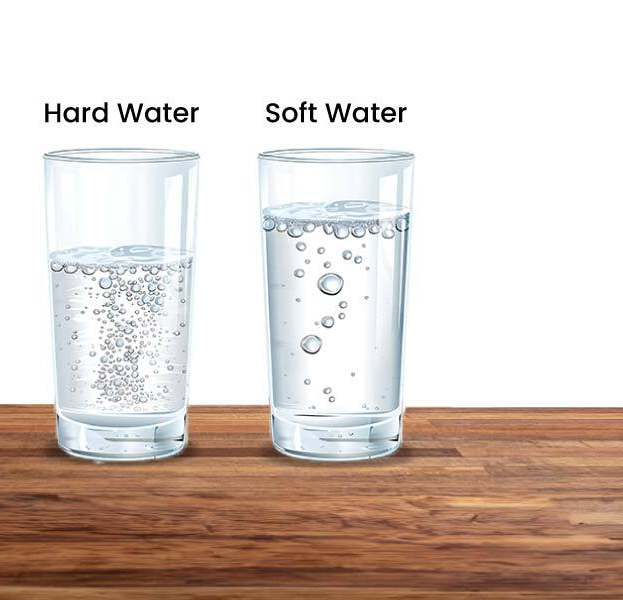Now Reading: Hard Water Ruining Your Home? Try This Simple Solution 2025
-
01
Hard Water Ruining Your Home? Try This Simple Solution 2025
Hard Water Ruining Your Home? Try This Simple Solution 2025

Table of Contents
If your taps leave white spots on dishes, or your skin feels dry even after a shower, hard water could be the culprit. Across the world, millions of households are quietly shifting to Hard Water for home use and for good reason.
Soft water is becoming increasingly popular as homeowners discover its benefits for health, appliances, plumbing, and even energy bills. Whether you’re building a new home or looking to improve your existing water system, understanding the value of soft water can lead to long-term savings and improved quality of life.
What Is Soft Water?
Soft water is water that contains low concentrations of calcium and magnesium ions, the primary minerals found in hard water. In simple terms, soft water is “gentler” on everything it touches—your hair, skin, pipes, and even the clothes in your washing machine.
Water becomes “hard” as it passes through soil and rock, picking up mineral salts. While not harmful to health, hard water can cause a variety of problems, from limescale buildup to inefficient heating systems. Softening the water involves removing these minerals, usually through a water softener system that replaces calcium and magnesium ions with sodium or potassium ions.
Why Soft Water Is Gaining Popularity
As awareness spreads, soft water systems are becoming standard in many homes, particularly in regions with naturally hard water. Here are the top reasons for this growing trend:
1. Cleaner, More Efficient Appliances
Hard water causes mineral deposits (commonly known as scale) in appliances like dishwashers, washing machines, and water heaters. These deposits reduce efficiency and shorten appliance lifespans.
With soft water, there’s less buildup, meaning appliances work better and last longer. Energy efficiency improves as well, particularly for water heaters, which can lose up to 30% of their heating power due to scale.
2. Softer Skin and Shinier Hair
One of the most immediate effects users notice is how their skin and hair feel after bathing in soft water. Unlike hard water, which leaves behind soap residue and mineral deposits, soft water allows soap and shampoo to lather more easily and rinse off completely.
This leads to smoother skin, silkier hair, and fewer issues like dryness or irritation—especially important for people with sensitive skin or conditions like eczema.
3. Sparkling Dishes and Laundry
With hard water, your clean dishes often end up with cloudy spots and streaks, and your clothes can look dull even after a wash. Soft water helps detergents dissolve more effectively, meaning your laundry gets cleaner and your dishes come out spotless—without needing extra soap or rinse aids.
4. Lower Utility Bills
The benefits of soft water go beyond comfort they also impact your wallet. Because soft water allows appliances to run more efficiently and reduces the amount of soap and detergent needed, families can save a significant amount of money each year.
Moreover, reducing scale in water heaters can cut energy bills, and fewer plumbing repairs are needed over time due to cleaner pipes and fixtures.
Is Soft Water Safe to Drink?
This is a common question. The short answer is yes—soft water is safe for most people. However, since the softening process adds a small amount of sodium, those on low-sodium diets may want to consult a healthcare provider. Alternatively, reverse osmosis systems can be used in combination with softeners to provide sodium-free drinking water.
Installing a Home Water Softener System
If you’re thinking about installing a soft water system, the process is simpler than you might expect. Most systems are installed near the main water supply line and can treat water for the entire house.
There are several types of water softeners available:
- Salt-based ion exchange systems: The most common and effective, these systems remove calcium and magnesium and replace them with sodium or potassium.
- Salt-free conditioners: These don’t remove minerals but alter them to reduce scaling. Ideal for those who prefer not to use salt.
- Dual-tank systems: Designed for high-demand homes, they ensure a continuous supply of soft water even during regeneration cycles.
Costs vary depending on the size of your home and water usage, but the investment often pays off within a few years through savings on appliances, detergents, and repairs.
Environmental Considerations
Some people worry about the environmental impact of salt-based systems due to salt discharge. While it’s true that these systems release salt into wastewater, the levels are generally considered safe when maintained properly. Newer models are also designed to use salt more efficiently.
Alternatively, salt-free systems are available and are a better fit for those in environmentally sensitive areas or on private septic systems.
How to Know If You Have Hard Water
The first sign of hard water is often visible: white chalky stains on faucets, cloudy glassware, dry skin, and stiff laundry. But the most accurate way to find out is through a simple water test. Many softener companies offer free testing or inexpensive DIY kits that show your water’s hardness level in grains per gallon (GPG).
- 0–3 GPG: Soft
- 4–7 GPG: Moderately hard
- 8–10 GPG: Hard
- Over 10 GPG: Very hard
If your home has water above 7 GPG, a softening system is highly recommended.
Final Thoughts
Soft water is more than just a luxury it’s a practical solution to many everyday problems caused by hard water. From better health and hygiene to longer-lasting appliances and lower utility bills, the benefits are wide-ranging.
As more homeowners become aware of these advantages, soft water is fast becoming a modern necessity rather than an optional upgrade. Whether you’re renovating your home or just tired of fighting limescale, soft water might just be the answer you’re looking for.
Read More:- Shobha Realty Launches Its Most Luxurious Project Yet—Full Details Inside 2025





















